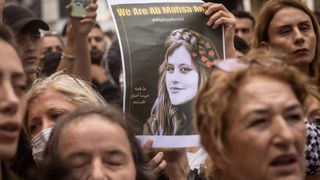Iranian authorities restrict Instagram and WhatsApp as last effort to silence protesters
Iranians need to use a VPN to access the social media services

Update: As of September 23, Iranian authorities have extended the block also to the popular messaging app WhatsApp, with NetBlocks describing the situation as "the most severe internet restrictions since the November 2019 massacre."
The death of a 22-year-old Iranian woman at the hands of Iran's morality police has sparked a wave of protests since Friday.
Authorities seem to be using different means to crackdown on protesters: from internet shutdowns, to water cannons and teargas. Local media has also reported that further "temporary restrictions" to telecommunications are planned.
Now, internet watchdog NetBlocks confirms that even access to Instagram has been filtered. This means that people in Iran will likely need software like a VPN to use what was one of the last social media platforms still available in the country.
⚠️ Update: Access to #Instagram, one of the last available social media platforms in #Iran, has been restricted amid protests over the death of #MahsaAmini; live metrics show frontend and CDN now disrupted on all major internet providers📰 Background: https://t.co/8cCHIJA2Oi pic.twitter.com/8r1Tv3TanISeptember 21, 2022
What's happening in Iran?
As NetBlocks explains in its report, Instagram's disruptions are just the latest attempt enforced by authorities to try and silence dissidents.
"Network data from NetBlocks confirm a near-total disruption to internet service in parts of Kurdistan province in west Iran from the evening of Monday 19 September 2022.
"The regional telecommunications blackout in and around Sanandaj follows a partial disruption to internet service in Tehran and other parts of the country on Friday when protests first broke out. Access to Instagram was subsequently restricted nationally on Wednesday 21 September."
Are you a pro? Subscribe to our newsletter
Sign up to the TechRadar Pro newsletter to get all the top news, opinion, features and guidance your business needs to succeed!
Everything started following the news that a 22-year-old Iranian woman had died in the custody of Iran's morality police in Tehran.
Originally from Saqqez in the Kurdistan province, Mahsa Amini came to the Iranian capital to visit her brother when she got arrested for allegedly violating strict hijab rules on September 15. She died three days later, after reportedly being fatally beaten.
Crowds of protesters have been filling the streets since, calling for justice.
Demonstrations have spread from Tehran to at least 15 other cities across the country. Dozens of people have been wounded and at least six demonstrators have been reported to have been killed during the crackdown.
As mentioned above, further internet restrictions are very likely to occur.
This has lead to Iranian internet users calling the international community to help them cover the events, while getting ready to bypass these connectivity blocks.
On Twitter, for example, many users are sharing their advice. Whether this is how to choose the best free VPN for circumventing such content restrictions, a secure browser like Tor, or encrypted messaging apps such as Signal and WhatsApp.


Chiara is a multimedia journalist committed to covering stories to help promote the rights and denounce the abuses of the digital side of life—wherever cybersecurity, markets and politics tangle up. She mainly writes news, interviews and analysis on data privacy, online censorship, digital rights, cybercrime, and security software, with a special focus on VPNs, for TechRadar Pro, TechRadar and Tom’s Guide. Got a story, tip-off or something tech-interesting to say? Reach out to chiara.castro@futurenet.com
